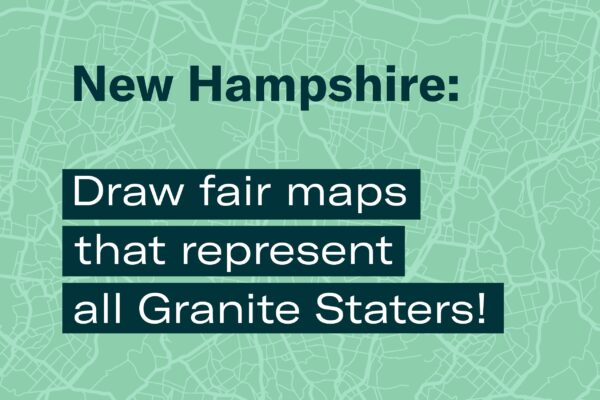This piece was originally published in the New Hampshire Bulletin on August 20, 2021. View it here.
Last week, New Hampshire received important population counts from the U.S. Census Bureau that lawmakers will soon use to redraw electoral district boundaries for Congress, state legislatures, and county offices. The overall process to redraw these district lines is known as “redistricting,” and it happens only once every 10 years – meaning the lines drawn in the coming months will be in place for the next decade.
What the U.S. census data showed us is that New Hampshire has changed in the 10 years since the last census: our population is moving from Western New Hampshire and the North Country toward the Seacoast, and is becoming more diverse. The politicians drawing these lines must keep that at the forefront, and ensure the new maps reflect this changing population.
In the Granite State, politicians from whichever party holds the majority are in charge of the process. That’s why it’s critical to ensure that fair maps are drawn every time redistricting occurs, meaning ones that are not sacrificed to self-interest and political parties. The new district lines must provide fair and equal representation for all people, upholding the 14th Amendment’s guarantee of equal protection, complying with the requirements of the Voting Rights Act of 1965, and Part I, Article 11 of the New Hampshire Constitution.
But all too often, new maps are purposefully drawn to unfairly give one political party an advantage, and do not accurately reflect the actual population. This practice, also known as gerrymandering, is a dangerous political tactic that has been around for hundreds of years. Instead of drawing fair maps, bad actors slice and dice communities so politicians can pick and choose who they represent. But voters should be choosing their politicians – not the other way around.
And here’s the thing: It’s clear that New Hampshire’s current maps are gerrymandered. One Executive Council district touches all three surrounding states (Vermont, Massachusetts, and Maine) with a distorted, dragon-like shape – two characteristics that, combined with mathematical analysis, demonstrate an egregious gerrymander. We also recently saw data from PlanScore and the national ACLU indicating that the current districts for the New Hampshire Senate have a Republican-leaning partisan bias of almost 6 percent.
Knowing this, our current maps cannot simply adhere to the status quo, and we certainly cannot accept maps that are even further gerrymandered. Electoral maps are supposed to fairly represent the will of the people, not politicians playing an unfair game to manipulate that will.
Not only does redistricting play a role in the design of the district boundaries for the Granite State’s congressional, state, and county offices, it plays a vital role in our communities and will affect our day-to-day lives for the next decade. The drawing of district lines can dictate not just who runs for public office and who is elected, but also how financial resources are allocated for schools, hospitals, roads, and more.
Along with the far-reaching consequences that gerrymandering can have on our everyday lives, improper redistricting can result in unequal representation in our voting districts, the dilution of the full voting power of minority voters, and fractured communities. Communities of color, in particular, continue to face numerous obstacles across the country to meaningful participation in the political process, including the redistricting process.
The map drawing process in New Hampshire is starting imminently – but it’s unclear what exactly that process will look like. Currently, what we know is that the majority Republican Party has appointed a special redistricting committee for the State House. The state Senate’s plans haven’t yet been announced. But whatever the process will be, it must be transparent.
Maps cannot and should not be drawn behind closed doors. There must be room for public participation, analysis, and change along the way. Maps represent every single Granite Stater, and we must collectively ensure that voters are given a fair chance to pick their politicians.
We at the ACLU of New Hampshire will continue to monitor this process to ensure it heeds the fundamental principles of democracy, representation, and equality, and we encourage all Granite Staters to get involved in advocating for a fair, transparent redistricting process this year.
Remember, this redistricting happens only once every 10 years – and we deserve fair, representative maps as we tackle this next decade.

